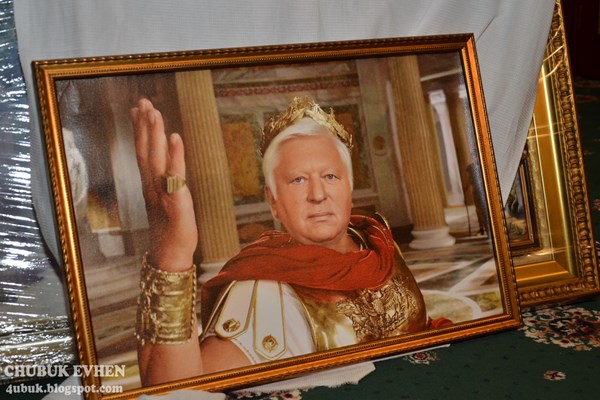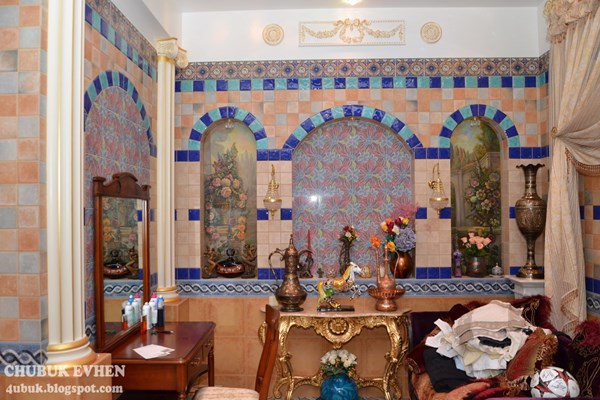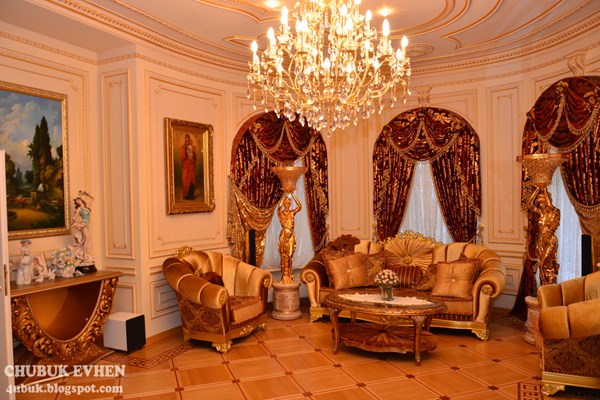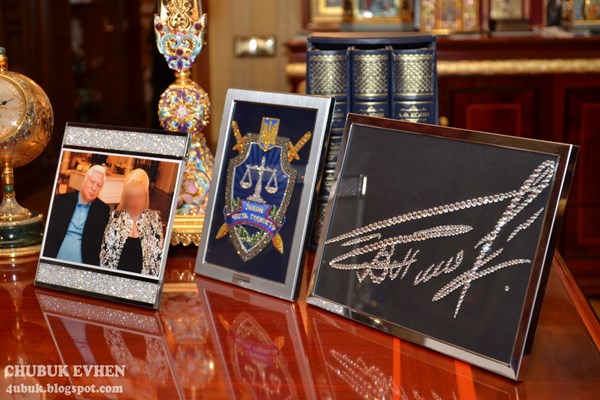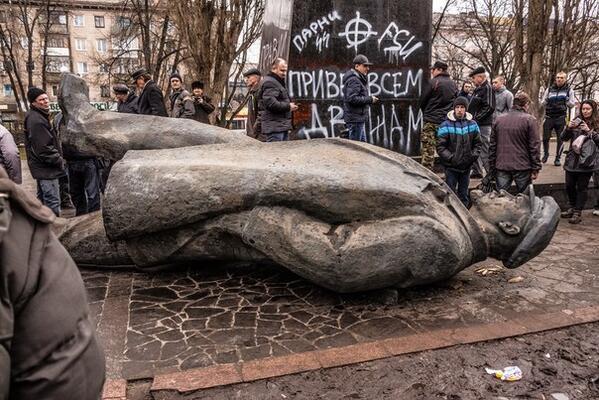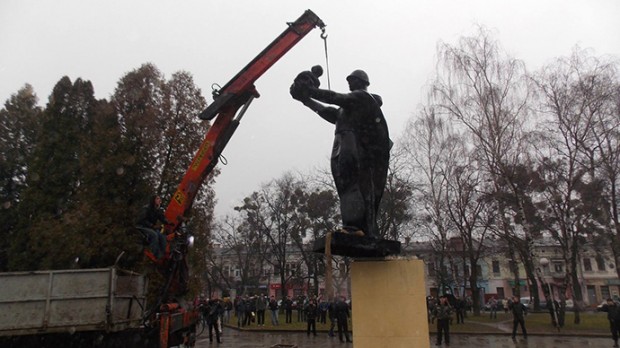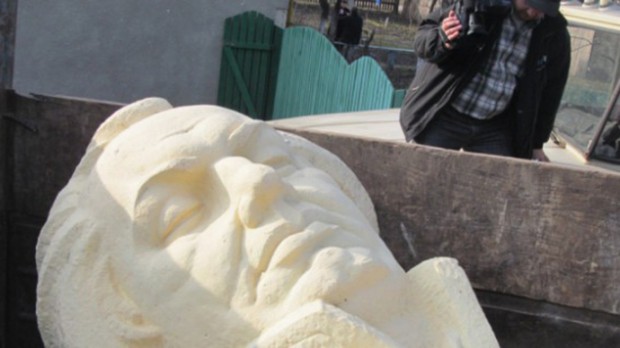Where is Yanukovych? Will Russia invade Crimea? Will Ukraine get emergency loans so the economy doesn’t collapse? Will the interim government reestablish control before the country falls into a darker chapter of this revolution?
As the country rebuilds, we’ll be watching.
Yesterday’s liveblog can be found here. For an overview of what’s behind the protests and analysis of last week’s news see our latest podcast.
Here is a livestream of the events:
Below, we will be making regular updates throughout the day:
2110 GMT: The opulence of the deposed President, Viktor Yanukovych, has been well-established. From private zoos to gold courses, to a pirate ship (it’s a “galleon” shaped dining room) to multiple houses filled with luxury items, the former president lived a life that many Ukrainians find disgusting, especially with their economy suffering so much.
Here is a single picture from the Kyiv Post’s gallery of his house in Mezhyhirya, complete with “marble floor mosaics and parquet with complex designs, wooden fixtures are made out of hardwood and are fitted perfectly.” See the whole gallery here:
But one of the most shocking signs of the depth of the corruption of this government may not come from the Yanukovych’s house, but Prosecutor General Viktor Pshonka’s home.
Expensive art, gold, wood-work, porcelain… here are just a few examples of the incredible wealth on display:
But the most amazing, to us — his signature, and the emblem of the justice system, made out of diamonds:
See the entire incredible gallery of pictures here.
2018 GMT: Hundreds of protesters have blocked the parliament building in Simferopol and have demanded a referendum on Crimea’s independence from Ukraine. They have also called on Russia to help them.
Meanwhile, any movement of Russian soldiers is being seen by some Ukrainians as a provocation. A citizen in Yalta reportedly filmed this video in Yalta today, which appears to show two military transports drive through the streets and into one of the bases for the Black Sea fleet.
Is the movement of two vehicles (with “LYUDI” written on the back, which means they’re transporting people) a sign of increased military activity? Maybe not, but on some level it doesn’t matter because incidents like these, combined with rhetoric on both sides, have a powerful impact on the psyche of people who feel like they have been bullied by a foreign neighbor who could now invade at any moment.
2005 GMT: Interfax reports that the State Duma is again considering measures to “protect Crimeans” by expediting and streamlining the issuing of visas and passports. Below we’ve translated a portion:
Russia is considering measures to protect Crimeans due to the difficult political situation in Ukraine, said the chairman of the State Duma Committee on CIS Affairs, links with compatriots, and Eurasian integration, Leonid Slutsky.
“In this situation, we will not abandon those who find themselves in a similar position. We will, literally in the next few days, have worked out an effective set of measures in the Duma, that will accept not only Crimeans, but all Russians in Ukraine, those who do not want to tear away from the Russian world, from Russia… We will find a way to overcome all of these issues”, said Slutsky at the Crimean office of Rossotrudnichestvo on Tuesday.
He had a meeting here with members of the Crimean coalition council of Russian compatriots.
“I think that in the event of any provocations against the residents of the east and southeast of Ukraine and the Crimean Republic we will take appropriate measures,” said Slutsky.
“We are here today to emphasize once again that we have always been, are and will be together with our brothers, together with the Crimeans”, remarked the Russian parliamentarian.
But in an editorial today titled “False Passport,” Gazeta.ru, which is often critical of the Russian government, cautions against taking as the official line of the Kremlin a rash of stories from right-wing Russian politicians about sending ships to the Crimea and handing out Russian passports to ethnic Russians in Ukraine.
“During a revolution, any careless word can be worse than a bullet. You can endlessly explain that the opinion of the Russian deputy Yevgeny Fyodorov (even if thrice a United Russia deputy) on the need to unite the Eastern part of Ukraine with Belarus and Russia is his personal opinion, but in Kiev, he is read and quoted as ‘the State Duma is proposing.’ And every shout from Maidan about ‘banning the Russian language’ symmetrically is read by most Russian citizens as a report that the new Ukrainian authorities have already shot all the Russian-speaking population.”
Yesterday Simferopol journalist Oleg Kryuchkov wrote a post on his Facebook page quoting Leonid Slutsky, head of the State Duma for the CIS, Eurasian Integration and Liaison, saying that Russia would start handing out Russian passports in Crimea using a simplified procedure.
“Slutsky himself refuted this information: ‘Crimean colleagues have taken the desired for the real. This question is of too fine a material which requires both a special treatment as well as a special decision from the leadership of the country,'” news agencies quote him.
Slutsky also said measures to protect the Russian-language population “will be worked out in the nearest future.”
But it was already impossible to put out the Facebook fire. Gazeta.ru says Slutsky is “not the most heavy-weight Russian diplomat, if he can even be called such. He is a deputy from the LDPR [of Zhirinovsky]. His party ideology dictates that he speak on all fronts of the protection of Russians, but it is far from fact that this is some sort of common ‘opinion of Moscow.'”
Ilya Drozdov — previously unknown — and also from the LDPR has also spoken about amendments to the Russian citizenship law, saying that ethnic Russians will be able to “submit proof of their ethnicity” and get a passport within six months. Former Georgian leader Mikheil Saakashvili is also saying that Putin wants to take back the Crimea from Ukraine.
“Hypothetically, Russians would like to return the Crimea, that’s true. And a putative Kremlin, in the mouths of putative deputies, fuels their interest,” says gazeta.ru. This is inciting a false hope, however, and is not an accurate characterization of where the Kremlin is really at now, says the paper.
“Russia doesn’t need the Crimea,” says gazeta.ru. “It needs all of Ukraine, but it has already lost all Ukraine. The Crimea is now only an instrument of internal propaganda and internal bargaining and only in a Foreign Ministry official’s nightmare would it become an instrument of external bargaining. Russia has done too much in the international arena to gain recognition as a full-fledged player to turn into a pariah, a usurper and instigator of war within a month.”
1940 GMT: Is antisemitism on the rise? To be sure, the right wing organization Pravyi Sektor, or “Right Sector,” and the Svoboda party are nationalist organizations linked with some radical ideologies. A very prominent Jewish Ukrainian, Vadim Rabinovich, president of the All-Ukrainian Jewish Congress (VEK) and co-founder of the European Jewish Parliament (EJP), writes that on the whole, these ideologies don’t play a key role in the majority of what has transpired in Ukraine, and antisemitism is not on the rise.
I categorically refute the statements appearing in a number of foreign media outlets of facts of massive anti-Semitism and xenophobia in Ukraine that do not correspond to reality!
The Interpreter has translated his entire statement. Read it here.
Skeptics have tweeted pictures like this, however, showing Nazi symbolism spray-painted on some monuments, especially near toppled Lenin statues:
But again, the question is not whether there is neo-Nazism (there is) but whether there is a rise in antisemitism as a result of the revolution, and whether the driving ideology of the revolutionaries is rooted in radicalism. As more journalists, Ukrainians, and Jews weigh in, it’s increasingly clear that they are not.
1646 GMT: Where is Yanukovych? Here is an interesting report that we’ve translated from Obozrevatel:
Criminal case opened against border guards who blocked Yanukovych
The Kirov Regional Department of Internal Affairs in the city of Donetsk has initiated criminal proceedings against the border guards who did not allow an aeroplane carrying Viktor Yanukovuch to leave Ukraine. Obozrevatel was informed of this by reliable sources. More details will be on our site later on.
Let us recall that on the evening of February 22, the Assistant Chairman of the State Border Service of Ukraine, Sergei Astakhov, said that they had not allowed a chartered flight, with Viktor Yanukovych on board, to fly out from Donetsk.
According to our information, when the inspectors arrived to process documentation, allowing the aircraft to fly, they were met by a group of armed men, who offered money in exchange for them allowing the flight without the proper clearance. After the border guards rejected this move, two armoured cars came up to the plane: Viktor Yanukovych came out of the aircraft and the airport grounds in one of those cars.
The border guards do not know where Yanukovych was about to fly to, as the flight was not processed.
1640 GMT: More Russian media propaganda — as we’ve been pointing out, the Russian media has been trying to spin the tale that the protesters in Maidan are mainly made up of Nazis, and the ethnic Russians inside Ukraine are in danger. There are certainly radical elements inside Ukraine’s opposition, but journalists on the ground, many people in the streets, and more and more Jewish voices inside and outside of Ukraine are arguing that this is just propaganda.
Enter RT.com’s newest slander article. The Russian state-operated news site has published an article entitled, “Alarming trend in Ukraine: Historic monuments toppled, Nazi symbols spread.” That’s an alarming headline. The removal of Soviet symbols has been well documented. But the symbols are being removed because of anger at Russia’s support for ousted president Yanukovych, not out of support for the Nazis whom the Russians helped defeat in World War II. And as many journalists have been present at these events, that has also been well documented.
But RT is running pictures like this:
With this description: “The next demolition is of the statue of the ‘Soviet Soldier’ in the town of Stryi, in the Lvov Region – despite thousands of Ukrainian soldiers having died there, protecting their motherland from the Nazi occupation.”
And then there is this picture:
With this hilarious description:
“The toppling craze reaches even the legendary Russian commander, who fought Napoleon, Field Marshal Mikhail Kutuzov. His victory must have obstructed earlier chances of EU integration, so the Western city of Brody did away with the monument.”
So Russia should have let Napoleon win to speed up EU integration? The jumps in logic are chuckle-worthy.
RT posts 4 pictures and 2 videos with similar headlines.
Then they turn to the Nazis. They have posted one picture of a spray-painted Swastika, one poster for a nationalist organization, and one picture of a man who may-or-may-not be giving a Nazi salute. That’s hardly an epidemic.
So, while Russian symbols are disappearing, they aren’t exactly being replaced by statues of Hermann Goering and Joseph Goebbels.
Instead, this is part of Russia’s strategy to sow distrust between the east and the west. And there are a lot of indications that it’s a strategy that works.
1540 GMT: If you are an American and you hear your politicians talk about Ukraine, you might want to cross-check their names against these two articles.
The Hill, which covers the Washington politics beat, has an article about how former Prime Minister Yulia Tymoshenko had a lobbying group working to get her free. The focus of the group was to lean on prominent politicians, including the Clintons, and congressmen on both sides of the isle:
Wiley Rein has been paid $920,000 under the contract with Oleksandar Tymoshenko, according to disclosure records filed with the Senate. But Justice documents show funds have been funneled through a half-dozen companies and firms, as well as Tymoshenko’s father and daughter, to reach the law firm.
Slattery said the companies that contributed funds to his effort were allies of the ex-prime minister.
“It was extremely difficult for the Tymoshenkos to move money out of the Ukraine. It was tricky,” Slattery said.
Buzzfeed, on the other hand, has profiled a lobbying group working to advance ousted President Viktor Yanukovych’s agenda, and they plan on continuing to work, even though he’s out of power. This group, which has as one of its members Vin Weber, a former congressman and Mitt Romney adviser, appears to have leaned mostly on American conservatives, and will continue to operate because it is funded privately:
In 2012, the group was involved in a campaign in which conservative American writers were given pro-Yanukovych talking points about the 2012 parliamentary elections which kept the Party of Regions in power and repeated them in outlets like RedState and Breitbart. One writer said they had been offered $500 per post.
The fact that the group is not officially a Ukrainian government entity allows it to avoid classification as a foreign principal, meaning its lobbyists can file under the Lobbying Disclosure Act instead of the much stricter Foreign Agent Registration Act.
1504 GMT: Many Western publications are asking whether Russia will militarily intervene in Ukraine, particularly in the southeast region of Crimea. We have been following this question very closely. But this isn’t just a question being asked in the West — the Russian media is asking the exact same question. Some in Russia are as worried for the prospect of war as those outside of it. We have translated an article that was published in the mainstream-but-liberal and well-respected media outlet Slon.ru, written by an established journalist, Oleg Kashin.
Kashin spells out all the rumors and reports of Russian miilitary mobilization, and there are very many. He also traces the history of Russian military, and says that he didn’t think that Russia would invade Georgia in 2008 — but they did.
A neighboring state has wound up without a president, without a government. The population of the Crimea, evidently, are not prepared to construct its European identity together with heroes from the Right Sector. There are rallies in Sevastopol, the Russian flag has replaced the Ukrainian one in front of the mayor’s office in Kerch. It would be trivial to find a pretext. Perhaps, unidentified Bandera followers will burn down a Russian ship in the Sevastopol harbor. Perhaps the Supreme Council of the Crimea will ask Russia to help maintain order in the region. Perhaps even President Yanukovych, whom Russia until now has not once called “former,” will turn up in Simferopol and as the legitimate head of state will appeal for help.
Of course there will be an international reaction, but we went through all that in 2008.
Consider this today’s must read: Could Russia Send Troops to the Crimea? The Russian media asks the question this time.
1425 GMT: Is Russia really stepping down their rhetoric? In some ways, but then they’re also stoking the fires:
Another Russophobic vandalism act took place in Lvov Region: monument to Russian army commander Kutuzov was pulled down. Stop this outrage
— MFA Russia (@mfa_russia) February 25, 2014
We’ll have much more on this topic later this morning, but needless to say, even if Russia is not actively pursuing war footing, it is still trying to divide Ukraine between the east and west, if not literally then ideologically and culturally.
1415 GMT: After days of heightened rhetoric that suggested that Russia could be plotting an invasion of Ukraine, today we’re seeing a softening of their stance. AFP reports:
“We confirmed our principled position of non-intervention in Ukraine’s internal affairs and expect that everyone follows similar logic,” Foreign Minister Sergei Lavrov said.
“We are interested in Ukraine being part of the European family, in all senses of the word,” he said after talks with Luxembourg counterpart Jean Asselborn.
But he added: “We agree that… it is dangerous and counterproductive to force Ukraine into a choice — either you are with us or against us.”
1400 GMT: Russia has tried hard to characterize this conflict as the rise of neo-Nazis and thugs over the law and order of the Yanukovych administration. What is coming to light now is that Yanukovych may have been using taxpayer funds to build pirate ships and golf courses, and his special forces appear to have coordinated to kill as many protesters as would be necessary to make sure the people never found out about it.
But what about the claims about the protesters? Journalist Amelia Glaser, associate professor of Russian and Comparative Literature and director of Russian, East European, and Eurasian Studies at the University of California, writes in the Jewish magazine Tablet that the Kremlin’s characterization of the protesters is completely inaccurate:
It would be convenient for Vladimir Putin if the protesters who have been in Kiev’s Maidan and on city squares across Ukraine all winter could be universally characterized as right-wing, anti-Semitic, ethnic supremacists—and, more to the point, if antagonism toward the country’s Jews could be shown to predominate in the country’s west, positioning Russia as the guarantor of their safety in the East. Make no mistake: It is indeed true that portraits of the Ukrainian nationalist hero Stepan Bandera hang near the Kiev barricades, and that some nationalists have been involved in the current revolution. It is also true that over the weekend a synagogue in eastern Ukraine was hit by fire bombs. But some reports suggest that much of the street violence that has occurred has been initiated by so-called Titushki—thugs hired to turn a peaceful protest violent—and that many of the deaths last Thursday were at the hands of snipers who shot at unarmed protesters. Last week’s escalation of violence helped Russia to justify making official announcements calling on the leaders of the “square” to “end the bloodshed on their end.”
The scene that activists in both the West and the East of Ukraine describe involves diversity without ethnic violence. The Maidan demonstrators have been protesting not only Yanukovych, but also those who would like to see the country divided in two, which would both drastically weaken Ukraine and bolster a Russian imperial presence in the region. The Russian political theorist Aleksandr Dugin has suggested, “Moscow should get actively involved in the reorganization of the Ukrainian space in accordance with the only logical and natural geopolitical model.” Both the governor of the eastern Kharkiv region, Mikhail Dobkin, as well as the mayor of the city of Kharkiv, Gennadyi Kernes, are of Jewish origin, and both have joined Russian proponents of a division of Ukraine into eastern and western segments. Some Internet trolls to make anti-Semitic slurs, but the leaders of the Maidan movement have not.
1350 GMT: The Ukrainian parliament (Rada) has ruled that if the impeached Ukrainian President Viktro Yanukovych is found, he will face trial at The Hague for killing protesters, and possibly for other charges.
And he’s not the only one who will be going to the International Criminal Court:
The parliament also voted that former interior minister Vitali Zakharchenko and the prosecutor general, Viktor Pshonka, should also be sent to the international criminal court. The pair have also fled Kiev, along with a number of other key Yanukovych aides.
On Tuesday afternoon, unconfirmed reports emerged that Andriy Kluyev – Yanukovych’s chief of staff – had been wounded during a gun battle. He was reported to have been shot in the leg after his car came under fire when he was travelling back to Kiev from visiting Yanukovych in Crimea. However, none of the details could be confirmed.
This has double symbolism. For starters, its the fiercest show of anger towards the ousted leader yet. But also, most countries opt to try their own deposed dictators, if they aren’t killed by the lynch mob. By sending Yanukovych to the ICC, the message is clear — we’re a modern nation, not bent on revenge but justice, and we are part of the European system.

